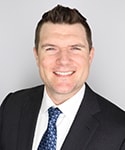Meet Our Fellows
The Minimally Invasive Gynecologic Surgery Fellowship in Jacksonville, Florida, draws trainees from across the U.S. and around the world. While all our trainees have a love of learning and a compassionate approach to patient care, they come from diverse backgrounds, family status, and professional and personal interests. Learn more about our current fellows.
Melissa Cantave, M.D. (PGY-6)
|
|
Hometown: Tinton Falls, NJ Medical school: Geisel School of Medicine at Dartmouth Residency: Washington University in St. Louis/BJH/SLCH Consortium |
Why did you choose to specialize in Minimally Invasive Gynecologic Surgery (MIGS)?
I chose to specialize in Minimally Invasive Gynecologic Surgery after my rotation during third year of residency. Being able to improve a patient’s quality of life with the skills and expertise of a MIGS surgeon really attracted me to the field. I am also passionate about women’s health, social justice, advocacy and the growing opportunities to advocate for patients in MIGS.
What attracted you to Mayo Clinic for fellowship training?
I was drawn to the Mayo Clinic because of how welcoming the faculty and fellows were during the interview process. I knew that I would get excellent surgical training with complex, challenging cases at a place like Mayo.
READMORE
What makes the MIGS fellowship at Mayo Clinic unique?
Being able to work one-on-one with urogynecologists, gynecologic oncologists, and MIGS surgeons who are experts in their fields makes the Minimally Invasive Gynecologic Surgery fellowship at Mayo unique. In addition, the surgical volume and complexity adds depth to fellow’s training and exposure.
What is living in Jacksonville like for you?
Living in Jacksonville has been great so far; I just need to get acclimated to the Florida heat. I am excited to explore the area with friends and lounge on the beach in my free time.
What does your future look like right now?
The future is bright and endless! I hope to continue my career as a MIGS surgeon at an academic institution where I can teach residents and fellows but also provide excellent care to my patients. I hope to grow as a leader and researcher in improving healthcare disparities, especially in gynecological surgical care.
Eric Messer Shuffle, M.D. (PGY-5)
|
|
Hometown: Saratoga, CA Medical school: University of Queensland Residency: University of Toledo |
Why did you choose to specialize in Minimally Invasive Gynecologic Surgery (MIGS)?
I chose to specialize in MIGS because it offers a unique opportunity to combine surgical precision, cutting-edge technology and patient-centered care. I’m especially interested in how robotic-assisted surgery is advancing the management of complex gynecologic conditions like uterine fibroids and endometriosis. These are conditions that can significantly affect a patient's quality of life, fertility, and overall health—and I find it incredibly rewarding to help patients find relief through minimally invasive approaches.
Robotic surgery, in particular, allows for greater dexterity, visualization, and precision in challenging anatomical spaces. I’ve seen how this technology can improve outcomes in patients who might otherwise require open procedures—especially those with distorted anatomy, deep infiltrating endometriosis, or large or multiple fibroids. The ability to offer effective, less invasive treatment with faster recovery times aligns with the kind of thoughtful, evidence-based, and compassionate care I want to provide.
Moreover, MIGS represents a field of constant innovation, which excites me both intellectually and technically. It allows me to pursue excellence in surgical skill while also being an advocate for better care for women with historically under-recognized and under-treated conditions.
What attracted you to Mayo Clinic for fellowship training?
I’m drawn to Mayo Clinic for fellowship because of its deep commitment to excellence in patient care, surgical innovation, and academic mentorship. As someone who is passionate about advancing minimally invasive options for patients with complex gynecologic conditions, I believe Mayo offers the ideal environment to refine both my technical skills and clinical judgment.
What stands out to me is the integrated, multidisciplinary model of care that the Mayo Clinic is known for. This collaborative approach is especially valuable in the management of endometriosis and fibroids, where coordination across specialties—radiology, pain management, reproductive endocrinology, and colorectal surgery—can dramatically impact outcomes. I’m eager to learn in a system that prioritizes comprehensive, patient-centered care.
Additionally, the volume and complexity of surgical cases at Mayo would allow me to grow technically, particularly in advanced laparoscopic and robotic procedures. I’m also excited by the strong emphasis on education and research. I want to train in an environment where clinical excellence goes hand-in-hand with academic curiosity—where I can contribute to research that advances the field and teaches future learners.
Ultimately, I see Mayo as a place where I can become the kind of surgeon I aspire to be: technically excellent, evidence-driven, and deeply committed to improving the lives of women through minimally invasive care.
READMORE
What makes the MIGS fellowship at Mayo Clinic unique?
The MIGS Fellowship stands out for its high surgical volume, advanced robotic and laparoscopic training, and its strong academic and multidisciplinary foundation. With access to world-class simulation centers, anatomy labs, protected research time not to mention world-class surgeons. This program fosters both surgical excellence and scholarly growth. The collaborative, team-based culture across multiple national campuses provides exposure to complex pathology in a patient-centered, referral-based setting, while also encouraging teaching, mentorship, and leadership development. This unique combination of technical rigor, academic support, and a commitment to innovation makes Mayo an ideal environment to train as a future leader in minimally invasive gynecologic surgery.
What is living in Jacksonville like for you?
Living in Jacksonville has felt like being home again. The warm, coastal environment—with its beautiful beaches, year-round sunshine, and abundance of outdoor activities—gives me the same sense of ease and connection to the natural coastlines of California where I grew up. Whether it's an early morning run on the beach, kayaking through the Intracoastal Waterway, or just watching the sunset over the water, I find it grounding and rejuvenating. What truly makes Jacksonville special, though, is its rich blend of multilingual and multicultural communities. The diversity here is reflected in the local food, music, and art scenes—from vibrant Latin festivals to international cuisine that reminds me of the vibrant cultures of home. It’s a city that feels inclusive and alive, and I’ve found both community and comfort here in ways that feel deeply familiar.
What does your future look like right now?
Right now, my future in MIGS is centered on becoming a surgeon who not only provides technically advanced, minimally invasive care but also actively contributes to innovation and equity in women’s health. I envision practicing in a setting that prioritizes research, education, and collaboration—where new technologies and approaches are used to improve outcomes for conditions like fibroids, endometriosis, and chronic pelvic pain. Just as importantly, I want to serve a diverse patient population in a health system that recognizes and addresses longstanding disparities in access, diagnosis, and treatment. My goal is to be part of a team that empowers patients through compassionate care, while also advocating for systemic changes that improve gynecologic health for all women.

